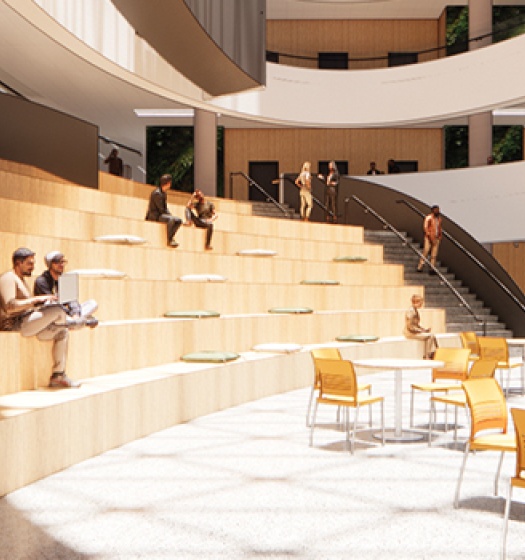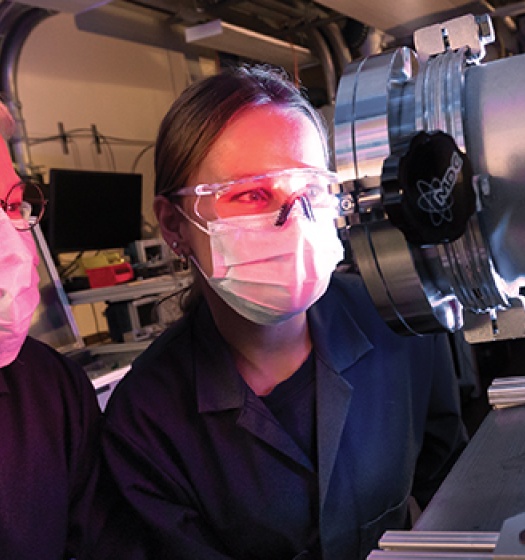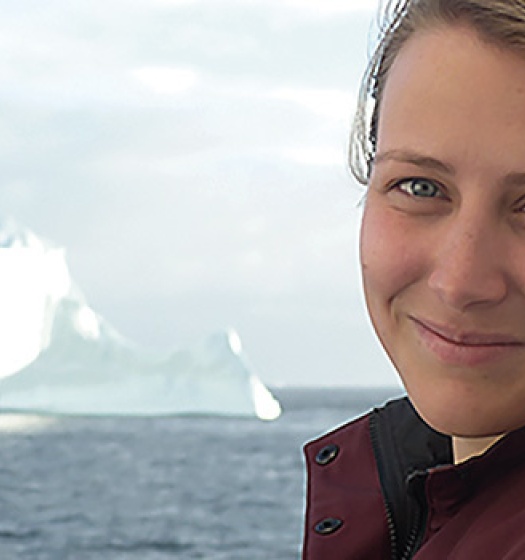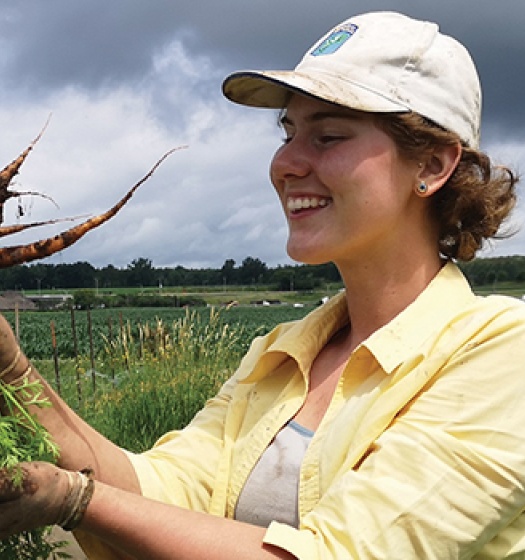The New Vic: Where sustainable ideas will take root
McGill’s New Vic Project maps out a bold vision for a portion of the vast historic site that was home to the Royal Victoria Hospital until 2015.
With the help of philanthropy, McGill aims to convert part of the former hospital into a state-of-the-art research, learning, and teaching hub dedicated to Sustainability Systems and Public Policy. An ambitious plan will reimagine three of the heritage buildings on Pine Avenue and replace a section of mid-century construction with a new pavilion featuring the most advanced standards of sustainability design.
The New Vic will house three research clusters that are vital to sustainability – Molecular/Materials Systems, Earth Systems, and Urban Systems – as well as the Max Bell School of Public Policy. Spaces for informal meetings and interaction will foster collaboration across disciplines.
By putting policy expertise into direct conversation with sustainability science and working with industry and government partners, the project will ensure that research is translated into tangible solutions.

Clean energy and green materials
Current sustainability research at McGill provides a window into the type of interdisciplinary collaborations that the New Vic will nurture.
The new McGill Centre for Innovation in Storage and Conversion of Energy (McISCE) aspires to be one of the world’s leading sites for research into carbon-free energy conversion and storage innovation. Based in the Faculty of Engineering, McISCE’s network includes members in the Faculties of Science, Agricultural and Environmental Sciences, and Management.
McISCE received a big boost in fall 2021 thanks to a $2-million donation from TD Bank Group (TD) that will bolster research capacity and train students who can develop clean energy storage technologies.

Professor Sylvain Coulombe and graduate student Lynn Hein examine a low pressure plasma system for the synthesis of advanced materials.
With current technology, energy can be harvested from alternatives to fossil fuels, such as wind and solar power. But the challenges of long-term storage and conversion of this energy impede its widespread use. That’s where McISCE’s research comes in.
“Hydrogen has the potential to be a clean energy commodity, but the problem is: how can we store it for heavy-duty transportation or long-distance energy delivery, or even for international energy trade?” says Jeffrey Bergthorson, a Professor in the Department of Mechanical Engineering and co-founder of McISCE.
His Alternative Fuels Lab is exploring the use of metal fuels as a means of storing energy and even producing hydrogen on demand.
“One idea is to use aluminum as a recyclable fuel and renewable energy commodity. The aluminum can later be burned with water to release hydrogen on demand rather than transporting and storing hydrogen itself,” explains Bergthorson. “Further, it’s completely sustainable, as you can keep re-using the aluminum over and over – it’s a circular fuel.”
Another ambitious multidisciplinary endeavour is the McGill Sustainability Systems Initiative (MSSI), which mobilizes researchers from diverse areas around large-scale sustainability challenges.
Audrey Moores, a Professor in the Department of Chemistry, co-leads the MSSI’s research theme on Creating Sustainable Materials.
“Our team has been developing new approaches to understanding the toxicity of nanoparticles; we have developed new materials for energy applications; we have investigated the toxicity of paint components,” says Moores. “In each of these projects, the key was the ability for us to learn how to work across multiple faculties.”
Students also benefit from transdisciplinary collaboration. “They get exposed to multiple disciplines and they get a much better perspective in systems thinking – trying to think systems as opposed to just small, divided problems,” Moores says.
Students step up to the challenge
Throughout McGill, students are working to protect the future of our planet. The New Vic Project will intensify these efforts and encourage more students to integrate ecological principles in their chosen career paths.
At the Max Bell School of Public Policy, Caroline Merner and a few classmates in her master’s program Policy Lab are examining how to mobilize government to implement climate adaptation solutions. Those solutions could involve natural infrastructure projects, like protecting wetlands, or bolstering existing critical infrastructure, says Merner, a McCall MacBain Scholar and co-founder of the non-profit Youth4Nature.
For their Policy Lab projects, small teams of students are matched with private, public, or non-profit organizations to solve a real-world policy issue. In Merner’s group, their sponsor is an insurance company. Merner says they get to reach out to stakeholders in Canada and internationally to learn about best practices and will complete a report by summer 2022.

Caroline Merner
The devastating flooding last fall in British Columbia will be part of their analysis. The floods damaged highways, her parents lost power and “communities of friends of mine” experienced flooding, Merner notes. “It hits close to home, and you recognize that the problem of climate change is not some distant in-the-future issue, but it really is on our doorstep.”
Impact200, McGill’s Bicentennial Student Sustainability Challenge, featured team projects that aim to address one or more of the United Nations’ 17 Sustainable Development Goals, such as clean water and sanitation. Team MiniWaste, led by two PhD candidates in Chemistry and a Chemical Engineering graduate, won the competition with a project called FoodMap that aims to reduce food waste and promote food security.
In the Faculty of Agricultural and Environmental Sciences, sustainability is a common thread running through academic programs and many of the experiential learning activities that students pursue. Thanks to donor support, all undergraduate students in the Faculty have the chance to complete an internship through the Alton and Dianne McEwen and Family Internship Program.
For her Summer 2021 internship, Bioresource Engineering student Kayla Dowd worked at the Macdonald Student-Run Ecological Gardens where interns and managers grow dozens of varieties of vegetables without the use of pesticides or herbicides. They supply weekly baskets to people who sign up for their Community Supported Agriculture Program and sell produce at local markets. “I think that MSEG was a cool space to apply a lot of what I learned in my degree and see what works in practice and what maybe doesn't,” says Dowd.

Kayla Dowd
Students learn everything from budget planning and marketing to planting, maintaining, and harvesting crops.
A student from B.C., Dowd received financial support through the Ernie Black Internship Fund, which covered her living costs in Montreal during the summer internship.
While the farm work involved long hours, “it was outside and fun and always different. A lot of problem solving, and a lot of independence as well. That’s something that I don’t think you would get on other farms, where you have decision-making power from the start,” Dowd says.
“It's the most educational job I've ever had because it's hands-on farm experience, and you are pretty quickly taking a lot of responsibility for the farm.”
Market gardening offers a lot of sustainability mainly through crop diversity and the focus on soil health that comes with it, she says. “We grow around 50 different crops every year. This year, we're doing about 113 varieties. That creates the potential to build soil structure and nutrients instead of depleting it, as well as encourage diversity of organisms in our fields.”
The internship office received a big boost in 2021 through a generous gift from alumnus Alton McEwen, BSc(Agr)’66. The internship program launched in 2009 with an important contribution from Marc Bieler, DipAgr’58, BA’64, and his wife Marie, BSc(Agr)’80.

